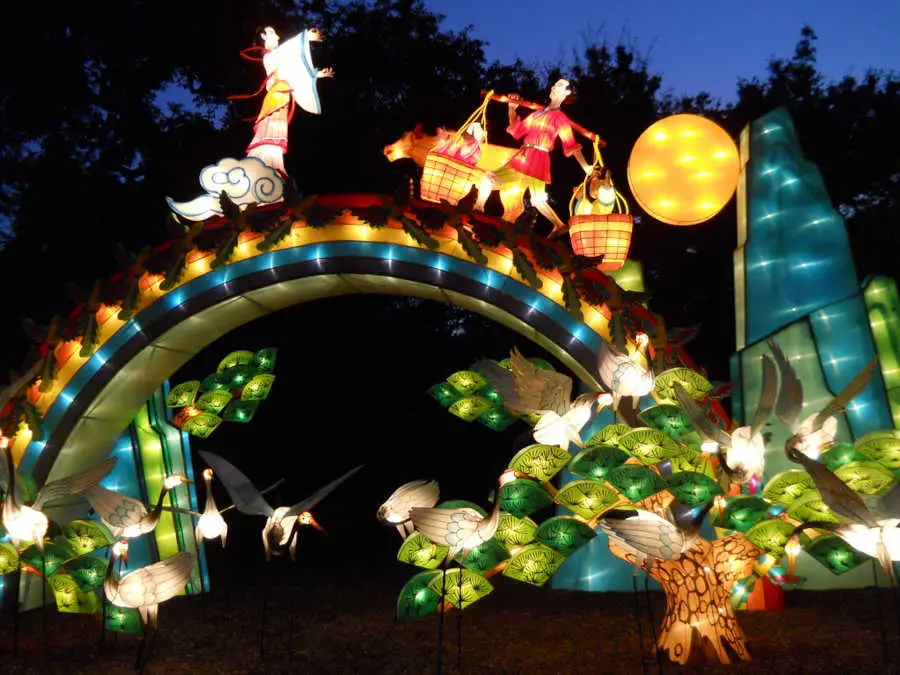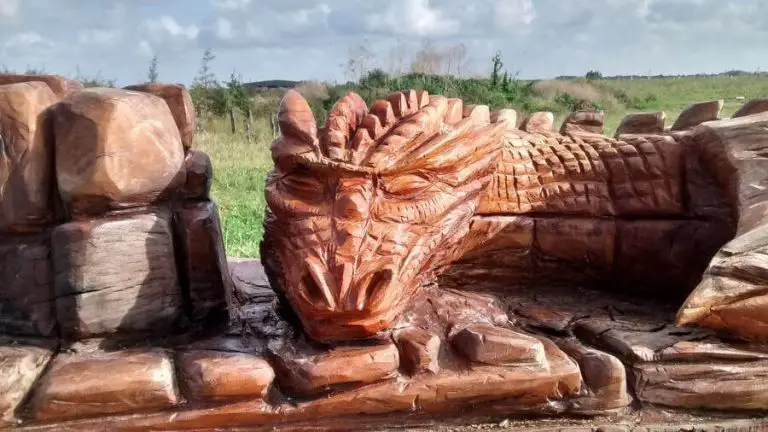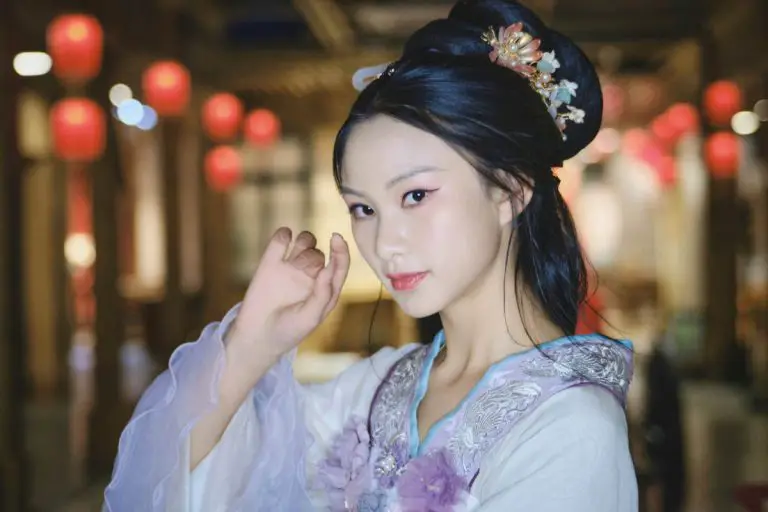Just like the other Chinese Festivals celebrated throughout the year, the Double Seventh Festival is considered a very important tradition in China and other Eastern countries.
As the name “Double Seventh” suggests, the Festival is held every 7th day of the 7th month. However, keep in mind that as with other Chinese Festivals, the Double Seventh Festival, or also called Qixi Festival (七夕), is celebrated based on the Chinese Lunar Calendar rather than our Gregorian Calendar, so it is celebrated on different dates each month, typically around July or August.
Unlike most other Chinese major festivals that often deal with commemorating ancestors and celebrations with family, the Double Seventh Festival is focused on romance. In other words, we can say that the Qixi festival is equivalent to Valentine’s day we celebrate in the West and all over the world.
In this post, we will learn all you need to know about the Double Ninth Festival, but let us begin by discussing the origin and history behind the Qixi Festival.
History and Origin of Double Seventh Festival
The earliest recorded history of the Double Seventh Festival dated back to the Han Dynasty period (206 BC – 220 AD). During this era, the festival is more widely known as the “Begging for Skills Festival” since the main activity is for the ladies to visit the temple and pray for the deities to grant them various life skills (sewing, making ornaments, poetry), wisdom, and a good husband.
The Begging for Skills Festival is still celebrated today in some areas in China, especially in China’s Xihe County, Gansu Province.
This festival continues to be celebrated until the times of the Sui and Tang dynasties, which is a period where this festival developed dramatically to become a major festival in ancient China. During this period, the temples and pavilions around the country were decorated with colorful fabrics, and poetry reading also became an important tradition during this festival.
The Double Seventh Festival grew even bigger during the Song and Yuan dynasty periods, and during these times, the festival is no longer a mere celebration but was also liven up with bazaars where people can sell and buy various things.
During Ming and Qing dynasties, the festival was widely considered a very important folk festival celebrated all around the country, and during this time people started putting fruits, dishes, and incense in temples and worship places, a tradition inspired by folklore, that we will discuss below.
The Legend of Niulang and Zhinu
The Double Seventh Festival we celebrate today is widely based on the legend of Niulang and Zhinu. While there are also other stories and legends about the Qixi festival, this one remains the most widely known.
In fact, the romantic story of Niulang and Zhinu is widely regarded as one of the best and most important ancient Chinese folktales, being selected as one of China’s Four Great Folktales along with Legend of the White Snakes, Liang Zhanbo and Zhu Yingtai, and Lady Meng Jiang.
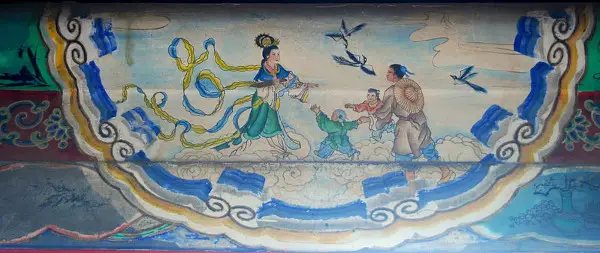
The folktale is also called “The Cowherd and Weaver Girl”, which told the story of Niulang, an honest and loyal cowherd. Niulang is a poor orphan that lived with his brother and sister-in-law, but the sister-in-law was really wicked and often persecuted Niulang in many different ways.
Long story short, the sister-in-law banished Niulang from her house, only giving Niulang a few pieces of clothing and an old cow for provision.
Niulang then wandered around with his old cow before finally settling down to build a house and a small shed for the cow. The cow was old, so many people were mocking Niulang and the seemingly useless cow, although Niulang disregarded them. Niulang kept taking care of the cow thoroughly and lovingly.
Seeing Niulang’s kindness, magically the cow spoke to Niulang and revealed that it is actually a deity who previously lived in heaven. Due to his past mistake, the deity was then banished from heaven and turned into a cow.
The cow told Niulang that not far from his house was a pond, and a weaver fairy will soon descend from heaven and take a bath in the pond. Following the instructions from the cow, Niulang came to the pond at the right time to meet the fairy named Zhinu.
Long story short, one thing lead to another, and Niulang and Zhinu fell in love with each other and got married.
The newlywed lived modestly but happily and was blessed with two beautiful children. However, their happiness didn’t last long.
The heavenly Emperor learned how Zhinu was married to a mortal human, which was a big taboo amongst the deities. The heavenly Emperor then send soldiers to forcefully bring back Zhinu to heaven, and they were successful with the mission. Niulang was very surprised and saddened to find Zhinu missing from the house, leaving him and their two children.
Not long after this, the old cow told Niulang about how Zhinu was brought back to heaven. The old cow felt that he’s going to pass away soon due to his old age, and told Niulang to use his skin to make a pair of shoes and two capes after his death.
Soon enough, the cow passed away, and Niulang fulfilled his last wish to make a pair of shoes and two capes. Niulang wore the shoes, while he gave the capes to his children. Together they were able to fly to heaven with the shoes and the capes, and they started looking for Zhinu.
The Empress of heaven, however, learned about their efforts and used her hairpin to create a white river, the Milky Way, blocking Niulang’s passage to heaven.
Niulang and his two children failed to reach heaven and were deeply saddened by this. However, the heavenly Emperor was touched by their weeping and ordered the magpies to build a bridge over the white Milky Way river so Niulang can cross and meet Zhinu.
However, the Emperor only allowed this family to reunite in one day every year, on the seventh day of the seventh month.
An Introduction to Chinese History & Culture (Aff.link)
Dive into China’s rich past and intriguing present! From ancient dynasties to modern powerhouses, uncover Chinese culture facts, pivotal moments, and the captivating tales that have shaped this vast nation.
Activities and Traditions During The Double Seventh Festival
As we can see from the Cowherd and Weaver Girl story above, the Double Seventh Festival celebration emphasizes romance, and here are some activities and traditions often performed during the festival
Worshipping the weaver fairy
The star Vega is believed to represent Zhinu the weaver girl, while Niulang is represented by the star Altair. When Vega is facing Altair, separated by the Milky Way (during the 7th day of the 7th Lunar month), it is believed to represent Niulang and Zhinu’s annual meeting.
To commemorate this event, young women often prepare a table of offerings with wine, tea, fruits, melon seeds, and others, and then they sat around the table to gaze at Vega and Altair, praying for a good husband and happy life. In the modern era, they also often play games or read poems until midnight.
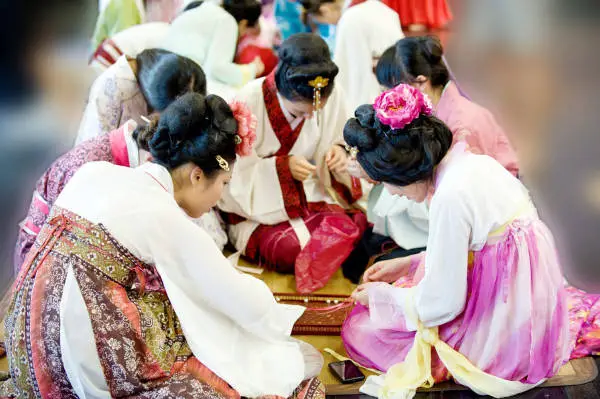
Handicraft Competition
Pretty rare to be observed nowadays but you can still find this practice in Rural China. Young women must demonstrate their skills and dexterity in the evening of the Qixi festival, the most popular contest is needle threading under the moonlight (the fastest one wins).
Another popular contest is to carve beautiful patterns and shapes like exotic flowers and birds on melon skin with a needle.
Unique Festival Foods
Eating unique dishes and snacks during the festival is not only treated as a celebration but also about wishing for love and good marriage.
Here are some traditional foods and snacks we can enjoy during the festival celebration:
- Qiaoguo
A crispy and sweet snack that is considered a very important symbol of the Double Seventh Festival. Made of flour and filled with sesame seeds, sugar, and honey. Very easy to make: simply mix flour with water and fill it with the desired fillings before deep-frying it.
- Dumplings
Dumplings are a very popular Chinese traditional food, and during the festival, we can get special dumplings decorated as copper coins (symbolizing wealth) and with additional toppings like the red date that symbolizes prayers for romance.
Double Seventh Festival In Other Countries
Japan: Tanabata Festival
Albeit the different name, the Tanabata Festival has many similar elements to the Qixi Festival. However, instead of commemorating Niulang and Zhinu, in Japan, they commemorate Orihime and Hikoboshi.
Tanabata is considered one of the five most important festivals in Japan, and during Tanabata, the young women tend to visit the nearest temple to write their hopes and prayer on paper before hanging this wish on a bamboo tree. Fireworks show is also common during the Tanabata festival.
Korea: Chilseok Festival
Similar to Tanabata and Qixi, the Korean version of the festival also commemorates a couple: Gyeonu and Jingyeo, despite slight variations in the folktales.
In the Chilseok festival, people will also visit the temple and gaze at Altair and Vega, and a variation of the Qiaoguo dish is also found in Korea, where they eat pan-fried wheat flour cakes filled with red bean paste.
Check out our “Free Culture Library“. We have compiled some great free resources, about Chinese culture, for your research.
Stay in Touch
 Join our newsletter by using the forms on this website or click here!
Join our newsletter by using the forms on this website or click here! Follow us on Google News
Follow us on Google News Follow us on Facebook
Follow us on Facebook
Featured Image: “Double Seventh Festival” by MBK (Marjie) is licensed under CC BY-NC-SA 2.0

